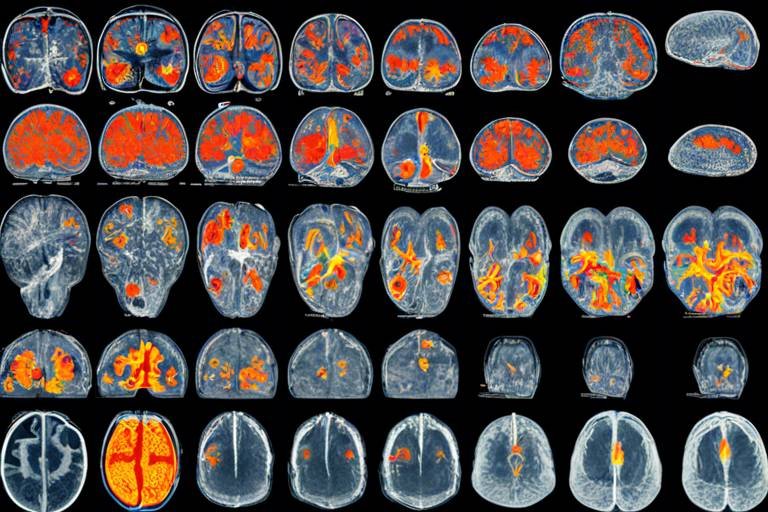Exploring the Science of Aging - New Discoveries
The quest to understand aging has captivated scientists and researchers for decades, and recent advancements have thrown open the doors to a world of possibilities. Imagine being able to not only extend our lifespan but also enhance the quality of those years. This is not just a dream anymore; it's becoming a reality as we delve deeper into the science of aging. With every new discovery, we inch closer to unraveling the complex tapestry of biological processes that govern how we age. From the intricate dance of our cells to the genetic blueprints that dictate our health, the landscape of aging research is evolving rapidly. The implications of these findings could be monumental, not just for individuals but for society as a whole. So, what exactly are these groundbreaking discoveries, and how might they revolutionize our understanding of aging? Buckle up as we explore the fascinating world of aging research and the incredible advancements that could redefine what it means to grow old.
Understanding the biological mechanisms behind aging is crucial. At the heart of aging lies a series of complex cellular processes that dictate how our bodies change over time. One of the key players in this process is telomeres, the protective caps at the ends of our chromosomes. Think of them as the plastic tips on shoelaces that prevent fraying. As we age, these telomeres shorten, leading to cellular aging and eventual cell death. But that's not all; genetic factors also come into play. Certain genes can either promote longevity or predispose us to age-related diseases. By exploring these biological intricacies, researchers are beginning to piece together the puzzle of aging, paving the way for innovative interventions that could enhance our healthspan—the period of life spent in good health.
The field of anti-aging research is buzzing with excitement as scientists unveil new breakthroughs that challenge our traditional understanding of aging. Innovative therapies, genetic modifications, and lifestyle interventions are at the forefront of this revolution. For instance, stem cell therapy is emerging as a potential rejuvenation technique. Imagine being able to repair and regenerate damaged tissues using your own cells! This could offer hope for age-related diseases and significantly increase vitality. In regenerative medicine, stem cells are utilized to restore function in aging tissues, and ongoing research is aimed at developing effective treatments for age-related ailments. However, with great power comes great responsibility, and the ethical implications of stem cell research cannot be overlooked. Scientists are actively addressing these concerns while striving for longevity.
Stem cell therapy is a promising avenue in the quest for longevity. These remarkable cells have the ability to differentiate into various cell types, which means they can potentially repair damaged tissues throughout the body. Imagine a world where we can reverse the effects of aging by harnessing the body's own healing mechanisms! Current research is focusing on how stem cells can be used to treat age-related conditions such as heart disease, neurodegenerative disorders, and even joint problems. The applications in regenerative medicine are vast, and ongoing studies are revealing more about how we can effectively utilize these cells to enhance our health.
In the realm of regenerative medicine, stem cells are proving to be invaluable. They are being used to develop treatments that restore function in aging tissues, which is a game-changer for those suffering from chronic conditions. For example, researchers are exploring how stem cells can be injected into damaged organs to promote healing and regeneration. This approach not only offers hope for individuals with debilitating diseases but also has the potential to improve overall quality of life as we age. As we continue to advance our understanding of stem cells, the possibilities for treating age-related ailments seem almost limitless.
However, the use of stem cells raises significant ethical questions. The moral implications of stem cell research are hotly debated, especially concerning the source of these cells. Scientists are working diligently to address these concerns, ensuring that research is conducted ethically and responsibly. Balancing the pursuit of knowledge with ethical considerations is crucial as we navigate this complex landscape. It's essential to foster open discussions about these issues to ensure that the advancements in aging research benefit humanity as a whole.
Caloric restriction has long been linked to increased lifespan in various organisms, and recent studies suggest that it may also have potential applications in humans. By reducing calorie intake without compromising nutritional value, researchers have observed remarkable effects on aging. This leads us to wonder: could simply eating less be the key to living longer? The science is still unfolding, but the evidence is compelling. As we explore the effects of caloric restriction, we may uncover strategies that not only extend lifespan but also enhance health during the aging process.
Genetics play a significant role in how we age, influencing everything from our susceptibility to diseases to our overall longevity. Specific genes have been identified that impact healthspan, and understanding these genetic factors is crucial for developing interventions that promote healthier aging. Imagine being able to tweak your genetic makeup to enhance your vitality as you age! This idea is not as far-fetched as it sounds, especially with the advent of gene therapy innovations.
Recent advancements in gene therapy offer exciting possibilities for combating age-related decline. Techniques like CRISPR have revolutionized the field, allowing scientists to edit genes with unprecedented precision. This opens the door to modifying aging-related genes, potentially leading to breakthroughs that could change the course of aging itself. The implications are staggering, and as research progresses, we may soon see practical applications that empower individuals to take control of their aging process.
Research on families with exceptional longevity provides fascinating insights into the genetic factors influencing aging. Case studies reveal patterns and traits that may contribute to longer lifespans, shedding light on the heritability of lifespan and health. By examining these families, scientists are piecing together the genetic puzzle that could unlock the secrets to a longer, healthier life. The stories of these extraordinary families inspire hope and curiosity, reminding us that the journey of aging is not just a biological process but a complex interplay of genetics, environment, and lifestyle.
- What is the main focus of aging research? Aging research primarily focuses on understanding the biological mechanisms behind aging and finding ways to enhance longevity and healthspan.
- How do telomeres affect aging? Telomeres shorten as we age, leading to cellular aging and eventual cell death, which is a significant factor in the aging process.
- What role do stem cells play in anti-aging? Stem cells can repair and regenerate damaged tissues, offering potential treatments for age-related diseases.
- Are there ethical concerns with stem cell research? Yes, the source of stem cells raises moral implications, and researchers are actively addressing these ethical considerations.
- Can caloric restriction actually extend lifespan? Studies suggest that caloric restriction may increase lifespan in various organisms, and research is ongoing to explore its effects in humans.

The Biology of Aging
Understanding the biological mechanisms behind aging is crucial for unlocking the secrets of longevity. As we age, our bodies undergo a myriad of changes at the cellular level, which can significantly impact our overall health and vitality. One of the key players in this process is the cell, the fundamental unit of life. Cells are constantly in a state of renewal and repair, but as we grow older, this process becomes less efficient. Imagine trying to maintain an old car; over time, parts wear out, and it becomes more challenging to keep it running smoothly. Similarly, our cells face wear and tear, leading to a decline in function.
One of the most fascinating aspects of aging is the role of telomeres. These protective caps at the ends of our chromosomes play a critical role in cellular aging. Every time a cell divides, telomeres shorten, and when they become too short, the cell can no longer divide. This phenomenon is akin to the fraying end of a shoelace; once it frays too much, it can no longer hold the lace together. This shortening process is linked to age-related diseases, making telomeres a hot topic in aging research.
Moreover, our genetics significantly influence how we age. Certain genes are associated with longevity and healthspan, which refers to the period of life spent in good health. For instance, studies have shown that individuals with specific variations of the FOXO3 gene tend to live longer and healthier lives. This gene is involved in regulating cellular stress responses and metabolism, highlighting the intricate connection between our genetic makeup and aging.
In addition to telomeres and genetics, the cellular environment also plays a pivotal role in aging. Factors such as inflammation, oxidative stress, and the accumulation of cellular waste can accelerate the aging process. Think of it as a garden; if you don’t regularly remove weeds and debris, the plants struggle to thrive. Similarly, our cells need a clean and supportive environment to function optimally. This is where lifestyle choices come into play, as diet, exercise, and stress management can significantly impact our cellular health.
To summarize, the biology of aging is a complex interplay of cellular mechanisms, genetic factors, and environmental influences. Understanding these components is essential for developing strategies that may enhance longevity and improve the quality of life as we age. As research continues to unveil the mysteries of aging, we may soon find ourselves on the brink of revolutionary discoveries that could change how we perceive the aging process.
- What are telomeres, and why are they important? Telomeres are protective caps at the ends of chromosomes that shorten with each cell division. They play a crucial role in cellular aging and are linked to age-related diseases.
- How does genetics influence aging? Specific genes can affect longevity and healthspan, with certain genetic variations associated with healthier aging.
- What lifestyle choices can impact the aging process? Diet, exercise, and stress management are all lifestyle factors that can significantly influence cellular health and aging.

Recent Advances in Anti-Aging Research
The quest for eternal youth has captivated humanity for centuries, and recent advancements in anti-aging research are bringing us closer to understanding and potentially manipulating the aging process. Scientists are making **groundbreaking discoveries** that not only shed light on how we age but also open up new avenues for extending our lifespan and enhancing our quality of life. One of the most exciting areas of research involves innovative therapies that target the biological mechanisms of aging, with the aim of rejuvenating our bodies and minds.
Among these advancements, **gene therapy** has emerged as a game changer. By utilizing cutting-edge techniques like **CRISPR**, researchers are exploring how to modify genes associated with aging. Imagine being able to edit out the genetic predispositions that lead to age-related diseases! This concept is no longer confined to the realm of science fiction; it's becoming a tangible reality. Scientists are investigating how these targeted genetic modifications can not only extend lifespan but also improve the overall healthspan—the period of life spent in good health—of individuals.
Another promising area is the use of **stem cell therapy**. Stem cells have the remarkable ability to differentiate into various cell types, making them ideal candidates for repairing damaged tissues and organs. This potential for regeneration is revolutionizing the treatment of age-related ailments. For instance, researchers are currently conducting studies to determine how stem cells can be used to restore function in aging hearts or to regenerate neurons in the brain, offering hope for conditions like Alzheimer's disease. The implications of these therapies could be profound, leading to not just longer lives but also healthier ones.
Regenerative medicine is harnessing the power of stem cells to create treatments that could change the landscape of aging healthcare. Currently, several applications are being explored, including:
- Tissue Engineering: Creating new tissues to replace those lost to injury or disease.
- Cell Replacement Therapy: Using stem cells to replace damaged or dysfunctional cells in the body.
- Organ Regeneration: Developing methods to regenerate entire organs, potentially eliminating the need for transplants.
These applications are not just theoretical; they are being tested in clinical trials around the world. As researchers continue to refine these techniques, we may soon see therapies that can significantly improve the quality of life for the elderly, allowing them to remain active and engaged well into their later years.
However, as we delve deeper into the realm of stem cell research and regenerative medicine, we must also confront the ethical implications that arise. The use of stem cells, particularly those derived from embryos, raises significant moral questions. How do we balance the potential benefits of these therapies against ethical concerns? Scientists and ethicists are actively engaging in discussions to address these issues, striving to ensure that advancements in anti-aging research are pursued responsibly and ethically.
In addition to gene therapy and stem cell applications, another fascinating area of study is **caloric restriction**. Research has shown that reducing calorie intake can lead to increased lifespan in various organisms, from yeast to primates. Scientists are now investigating how these findings might translate to human health. The idea is that by limiting our caloric intake without malnutrition, we may be able to activate certain biological pathways that promote longevity. This could be a practical approach for those looking to enhance their health as they age.
In conclusion, the field of anti-aging research is advancing at an unprecedented pace, offering hope for healthier, longer lives. With innovations in gene therapy, stem cell treatments, and lifestyle interventions like caloric restriction, we are on the brink of a new era in aging science. As we continue to explore these exciting frontiers, the dream of aging gracefully and healthily may soon be within our reach.
1. What is the main goal of anti-aging research?
The primary aim of anti-aging research is to understand the biological mechanisms of aging and develop therapies that can extend lifespan and improve health during aging.
2. How does gene therapy contribute to anti-aging?
Gene therapy can potentially modify genes associated with aging, reducing the risk of age-related diseases and enhancing overall healthspan.
3. What role do stem cells play in aging research?
Stem cells have the ability to repair and regenerate damaged tissues, making them a promising avenue for treating age-related conditions and improving vitality.
4. Are there ethical concerns regarding stem cell research?
Yes, the use of stem cells, particularly those derived from embryos, raises ethical questions that researchers and ethicists are actively discussing to ensure responsible research practices.

Stem Cell Therapy
Stem cell therapy is rapidly emerging as a groundbreaking technique in the field of regenerative medicine, offering a glimmer of hope for rejuvenation and vitality as we age. At its core, this innovative approach harnesses the unique properties of stem cells, which are undifferentiated cells capable of developing into various cell types. Imagine them as the body's natural repair crew, ready to swoop in and mend damaged tissues. This potential for repair is particularly crucial as we confront the myriad health challenges associated with aging, such as heart disease, arthritis, and neurodegenerative disorders.
Recent studies have shown that stem cell therapy can significantly improve the quality of life for individuals suffering from age-related diseases. For instance, researchers have successfully used stem cells to regenerate heart tissue in patients with heart failure, leading to remarkable improvements in heart function. The implications of this are staggering: what if we could not only extend our lifespan but also enhance our health during those additional years? This is the tantalizing promise of stem cell therapy.
In addition to its applications in treating specific diseases, stem cell therapy holds the potential for broader applications in the realm of anti-aging. By replenishing the body's supply of healthy cells, stem cells could help combat the general decline associated with aging. However, while the potential is immense, the journey from laboratory research to clinical application is fraught with challenges. Issues such as cell sourcing, ethical considerations, and regulatory hurdles must be navigated carefully.
One of the most exciting aspects of stem cell therapy is its versatility. There are various types of stem cells, such as embryonic stem cells, adult stem cells, and induced pluripotent stem cells (iPSCs), each with unique properties and potential applications. Here's a brief overview of these types:
| Type of Stem Cell | Source | Potential Applications |
|---|---|---|
| Embryonic Stem Cells | Embryos | Tissue regeneration, organ repair |
| Adult Stem Cells | Bone marrow, fat tissue | Repair of specific tissues, blood cell production |
| Induced Pluripotent Stem Cells (iPSCs) | Reprogrammed adult cells | Research, potential therapies for various diseases |
As we explore the potential of stem cell therapy, it is essential to consider the ethical implications surrounding its use. The extraction of embryonic stem cells, for instance, raises significant moral questions. Scientists and ethicists are actively engaging in discussions to address these concerns, aiming to balance the promise of scientific advancement with the need for ethical integrity.
In summary, stem cell therapy represents a frontier in our understanding of aging and disease. It is not merely a treatment; it is a potential revolution in how we approach health as we age. As research continues to unfold, we may find ourselves on the brink of a new era where the aging process can be mitigated, allowing us to lead longer, healthier lives. This is not just about adding years to our life; it's about adding life to our years.
- What are stem cells? Stem cells are unique cells capable of developing into different cell types and have the potential to repair damaged tissues.
- How does stem cell therapy work? Stem cell therapy involves the introduction of stem cells into a damaged area of the body, where they can regenerate and repair tissues.
- Are there risks associated with stem cell therapy? Yes, like any medical treatment, stem cell therapy carries risks, including infection, immune rejection, and the potential for tumors.
- What is the future of stem cell therapy in aging? Ongoing research aims to refine stem cell therapies, making them safer and more effective, with the goal of improving longevity and healthspan.

Applications in Regenerative Medicine
Regenerative medicine is an exciting field that harnesses the body's innate ability to heal itself, and stem cells are at the forefront of this revolution. Imagine a world where damaged tissues can be repaired, and degenerative diseases can be effectively treated. This is not just a dream; it's becoming a reality thanks to advancements in stem cell research. Scientists are exploring how these remarkable cells can be utilized to regenerate tissues and organs, offering hope to those suffering from age-related ailments.
One of the most promising applications of stem cells in regenerative medicine is in the treatment of conditions like Parkinson's disease, diabetes, and heart disease. For instance, researchers are investigating how stem cells can be used to replace damaged neurons in the brain of Parkinson's patients, potentially restoring lost motor functions. Similarly, in diabetes, stem cells may be able to regenerate insulin-producing cells in the pancreas, providing a long-term solution to this chronic condition.
Additionally, stem cell therapy is being explored for its potential in orthopedics. Injuries to joints and cartilage can be debilitating, often leading to surgeries or chronic pain. Stem cells can be injected into damaged areas to promote healing and regeneration, significantly improving the quality of life for patients. The ability to repair and regenerate tissues means that people may not have to rely on invasive surgical procedures as frequently, which is a game changer in the medical field.
However, the applications of stem cells do not stop there. They are also being investigated for their role in cardiovascular health. Heart attacks can cause irreversible damage to heart tissue, but studies are showing that stem cells could be used to repair this damage, leading to improved heart function. As research progresses, we may soon see stem cell therapies becoming a standard treatment for heart disease, potentially saving millions of lives.
Despite the promising potential of stem cell therapy, it's essential to understand that the field is still in its infancy. Ongoing research is crucial to determine the most effective methods of utilizing these cells safely and ethically. Scientists are diligently working to address challenges such as immune rejection and the risk of tumor formation, ensuring that future therapies are both safe and effective.
In summary, the applications of stem cells in regenerative medicine are vast and varied. As we continue to unlock the secrets of these powerful cells, the potential to treat age-related diseases and enhance our quality of life grows exponentially. The future looks bright, with the possibility of not just extending lifespan but also improving healthspan, allowing us to live not just longer, but better.
- What are stem cells? Stem cells are unique cells capable of developing into various types of cells in the body, playing a crucial role in repairing and regenerating tissues.
- How does stem cell therapy work? Stem cell therapy involves the use of stem cells to repair or replace damaged tissues, promoting healing and recovery.
- Are there risks associated with stem cell therapy? Yes, potential risks include immune rejection and the possibility of tumor formation, which researchers are actively working to mitigate.
- What conditions can stem cell therapy treat? Stem cell therapy shows promise in treating conditions such as Parkinson's disease, diabetes, heart disease, and orthopedic injuries.

Ethical Considerations
As we dive deeper into the promising realm of stem cell therapy and its potential to revolutionize aging and health, we must also confront a myriad of that arise from this powerful technology. The prospect of manipulating human biology to extend life and restore health is undeniably enticing, yet it comes wrapped in a complex web of moral dilemmas. For instance, one of the primary concerns revolves around the source of stem cells. Many stem cell therapies utilize embryonic stem cells, which are derived from human embryos. This practice raises profound questions about the moral status of embryos and whether it is justifiable to use them for research and treatment purposes.
Moreover, the potential for designer therapies that enhance or modify human traits introduces another layer of ethical complexity. If we can edit genes to promote longevity or improve health, will we also be tempted to enhance physical or cognitive traits? This notion of "playing God" can lead us down a slippery slope, where the line between therapeutic interventions and enhancements becomes blurred. The societal implications of such advancements cannot be overstated. We must consider how access to these therapies might be distributed. Will they be available to all, or only to those who can afford them? This disparity could exacerbate existing inequalities and create a two-tiered system of health and longevity.
To address these ethical dilemmas, researchers and ethicists are actively engaging in discussions to establish guidelines that ensure responsible research and application of stem cell therapies. Key considerations include:
- Informed Consent: Ensuring that patients and donors are fully informed about the procedures and potential outcomes.
- Transparency: Maintaining open communication about the risks, benefits, and ethical implications of stem cell research.
- Equity: Striving for fair access to therapies, regardless of socio-economic status.
Ultimately, the conversation surrounding the ethics of stem cell therapy is ongoing and multifaceted. As we unlock the secrets of aging and explore the potential for rejuvenation, it is imperative that we navigate these waters with caution and a strong moral compass. Balancing the benefits of scientific advancement with ethical responsibility will be crucial in shaping the future of longevity research.
What are stem cells?
Stem cells are unique cells capable of developing into many different cell types in the body. They play a crucial role in repairing and regenerating damaged tissues.
Why are ethical considerations important in stem cell research?
Ethical considerations are vital to ensure that research is conducted responsibly, respecting the rights and dignity of individuals and addressing potential societal impacts.
How can we ensure equitable access to stem cell therapies?
Ensuring equitable access requires policies that promote affordability and availability of treatments, as well as ongoing dialogue about health disparities.
What are the potential risks of stem cell therapies?
Potential risks include immune rejection, tumor formation, and the ethical implications of using certain types of stem cells, particularly embryonic stem cells.
How is stem cell therapy regulated?
Stem cell therapy is regulated by various governmental and ethical bodies that set guidelines to ensure safety, efficacy, and ethical compliance in research and clinical applications.

Caloric Restriction and Longevity
When it comes to the quest for longevity, caloric restriction has emerged as a fascinating area of study. Imagine your body as a finely tuned machine; just like any machine, it operates best when it’s not overloaded. Research suggests that reducing calorie intake without malnutrition can lead to a significant increase in lifespan across various species, from yeast to mammals. This phenomenon raises an intriguing question: could eating less actually help us live longer?
Several studies have pointed to the potential benefits of caloric restriction (CR). For instance, a landmark study conducted on monkeys showed that those on a reduced-calorie diet exhibited not only a longer lifespan but also a lower incidence of age-related diseases such as diabetes and heart disease. So, what’s the science behind this? It appears that CR may activate certain biological pathways that promote cellular repair and reduce inflammation, akin to hitting a reset button on our aging process.
To better understand these mechanisms, let’s break down some of the key findings:
- Cellular Repair Mechanisms: Caloric restriction seems to enhance autophagy, the process by which cells remove damaged components. Think of it as a spring cleaning for your cells, helping to keep them functioning optimally.
- Hormonal Changes: CR influences hormone levels, particularly insulin and growth factors, which play crucial roles in metabolism and aging. Lower insulin levels can lead to improved insulin sensitivity, reducing the risk of chronic diseases.
- Reduced Oxidative Stress: By decreasing the intake of calories, the body may produce fewer free radicals, which are known to contribute to aging and cellular damage.
But before you start counting calories like a hawk, it’s essential to approach caloric restriction with caution. It's not just about eating less; it’s about eating right. Nutrient density is key. If you're cutting back on calories, you need to ensure that your meals are packed with essential vitamins and minerals. A diet rich in fruits, vegetables, whole grains, and lean proteins can provide the necessary nutrients while keeping caloric intake in check.
Interestingly, some researchers are exploring the idea of intermittent fasting as a practical alternative to continuous caloric restriction. Intermittent fasting involves cycling between periods of eating and fasting, which may trigger similar cellular responses to CR. The beauty of this approach is that it can be less restrictive and more sustainable for many individuals, making it an appealing option for those looking to enhance their longevity without feeling deprived.
As we delve deeper into the science of caloric restriction, it’s clear that this area of research holds promise. However, it’s important to remember that aging is a complex process influenced by a myriad of factors, including genetics, environment, and lifestyle choices. While caloric restriction may offer significant benefits, it should be considered as part of a holistic approach to health and longevity.
1. Is caloric restriction safe for everyone?
While caloric restriction may have benefits, it’s not suitable for everyone. Individuals with certain health conditions, pregnant or breastfeeding women, and those with a history of eating disorders should consult a healthcare professional before making significant dietary changes.
2. How much should I reduce my calorie intake?
Research suggests that a reduction of 20-30% in daily caloric intake can be beneficial, but it’s essential to ensure that you’re still meeting your nutritional needs. A registered dietitian can help tailor a plan that works for you.
3. Can I practice caloric restriction without feeling hungry?
Yes! Focus on consuming nutrient-dense foods that are high in fiber and protein. These foods can help you feel fuller longer, making it easier to adhere to a reduced-calorie diet.
4. What are some practical ways to implement caloric restriction?
Consider meal prepping, incorporating more plant-based meals, and practicing mindful eating. These strategies can help you reduce caloric intake while still enjoying your meals.

The Role of Genetics in Aging
When we talk about aging, it’s like peeling an onion—each layer reveals something new and fascinating. One of the most intriguing layers is genetics. You might be surprised to learn that our genes play a significant role in how we age, influencing not just our lifespan but also our healthspan, which refers to the period of life spent in good health. Imagine your genes as a set of instructions for building and maintaining your body; some are designed to help you thrive, while others may predispose you to age-related diseases.
Research has shown that specific genes can dictate how efficiently our bodies repair themselves, manage stress, and respond to environmental factors. For instance, variations in the FOXO3 gene have been linked to longevity. Those who carry certain versions of this gene may enjoy a longer, healthier life. It’s almost like having a secret code that helps you unlock the door to a healthier aging process. But the story doesn’t end there; genetics is just one piece of a much larger puzzle.
Moreover, scientists are exploring the potential of genetic interventions to enhance our longevity. Techniques such as CRISPR gene editing are paving the way for exciting possibilities. Imagine being able to snip out the genetic factors that lead to age-related decline, much like editing a document to remove errors. While this technology is still in its infancy, the implications for aging are staggering. Researchers are hopeful that in the future, we might be able to modify our genes to promote healthier aging and combat diseases that typically come with old age.
To further illustrate the impact of genetics on aging, let’s take a look at some fascinating findings from family studies. These studies have revealed that certain families exhibit exceptional longevity, raising questions about the heritability of lifespan. For example, researchers have found that siblings and parents of centenarians often share similar genetic traits that may contribute to their long lives. This suggests that genetics can create a familial blueprint for aging, which is a powerful idea.
| Gene | Impact on Aging |
|---|---|
| FOXO3 | Linked to longevity and stress resistance |
| APOE | Associated with Alzheimer's disease risk |
| WRN | Involved in DNA repair and maintenance |
While genetics undoubtedly plays a crucial role in aging, it’s essential to remember that it’s not the only factor at play. Environmental influences, lifestyle choices, and even social interactions can significantly affect how our genes express themselves. It’s like a symphony where genetics provides the score, but lifestyle and environment conduct the orchestra. Together, they create the music of our lives, influencing how we age and how well we can enjoy those golden years.
In conclusion, understanding the role of genetics in aging opens up a world of possibilities. As research continues to evolve, we may find ourselves on the brink of revolutionary breakthroughs that could change how we perceive aging itself. So, the next time you think about aging, remember: it’s not just about the years you’ve lived, but the genetic legacy you carry and how you choose to nurture it.
- How much do genetics influence aging? Genetics can significantly affect lifespan and healthspan, but lifestyle and environment also play crucial roles.
- What are some genes linked to longevity? Genes like FOXO3 and APOE have been studied for their associations with longevity and age-related diseases.
- Can gene therapy really help with aging? While still in research stages, gene therapy holds potential for modifying genes associated with aging and improving health outcomes.

Gene Therapy Innovations
Recent advancements in gene therapy have opened up a world of possibilities in the quest to combat age-related decline. Imagine a world where scientists can edit our genes with the precision of a word processor, correcting the typos that lead to aging and disease. This is not science fiction; it’s becoming a reality with techniques like CRISPR (Clustered Regularly Interspaced Short Palindromic Repeats). This groundbreaking technology allows researchers to target and modify specific genes, potentially reversing the effects of aging at a cellular level.
So how does this work? Essentially, CRISPR acts like a pair of molecular scissors, cutting DNA at precise locations. Once the DNA is cut, scientists can either disable problematic genes or insert new ones that promote healthier cellular functions. This could lead to breakthroughs in treating age-related diseases such as Alzheimer’s, heart disease, and even certain types of cancer. The potential is staggering!
One of the most exciting aspects of gene therapy innovations is their potential application in preventative medicine. Instead of waiting for diseases to manifest, we could proactively modify our genetic makeup to enhance longevity and improve our quality of life. For instance, researchers are exploring how gene editing could boost the body's natural defenses against age-related decline. Imagine having genes that not only resist diseases but also promote cellular repair and regeneration!
However, with great power comes great responsibility. The ethical implications of gene therapy are profound. Questions arise such as: Should we be allowed to edit our genes? What are the long-term effects of such modifications? To address these concerns, scientists and ethicists are working together to establish guidelines that ensure the responsible use of gene editing technologies. It’s a balancing act between innovation and ethical integrity, and it’s crucial that we tread carefully.
As we look to the future, the potential for gene therapy to revolutionize aging research is immense. Here’s a quick overview of some key innovations:
| Innovation | Description | Potential Impact |
|---|---|---|
| CRISPR | A gene-editing tool that allows scientists to modify DNA sequences. | Could lead to treatments for genetic disorders and age-related diseases. |
| Gene Silencing | A technique to turn off harmful genes. | May prevent the onset of diseases linked to aging. |
| Gene Replacement Therapy | Replacing faulty genes with healthy ones. | Could restore normal function to cells affected by age-related decline. |
In conclusion, the innovations in gene therapy represent a thrilling frontier in the study of aging. As researchers continue to explore the genetic underpinnings of longevity, we may soon find ourselves at the dawn of a new era where aging is not just a process we endure but a condition we can actively manage. The future holds promise, and with it, the hope for a healthier, longer life.
- What is gene therapy? Gene therapy is a technique that modifies a person's genes to treat or prevent disease.
- How does CRISPR work? CRISPR allows scientists to edit genes by cutting DNA at specific locations, enabling the addition or removal of genetic material.
- Are there ethical concerns with gene therapy? Yes, the potential for misuse and long-term effects raises significant ethical questions that researchers are actively discussing.
- Can gene therapy prevent aging? While still in research stages, gene therapy holds promise for delaying age-related diseases and potentially extending lifespan.

Family Studies and Longevity
When we think about longevity, the first thing that often comes to mind is diet, exercise, and lifestyle choices. However, what if I told you that our genes could play an equally significant role in how long we live? Family studies have revealed some fascinating insights into the genetic factors that contribute to longevity. Research has shown that families with a history of exceptional lifespan often share specific genetic traits that may influence their health and longevity.
For instance, a study conducted on the Blue Zones—regions of the world where people live significantly longer than average—has shown that genetics can account for up to 25% of the variation in lifespan. This means that if your grandparents lived to a ripe old age, there's a good chance you might too! But it's not just about luck; it’s about understanding the biological mechanisms at play.
Researchers have identified several key genetic factors that appear to be associated with longevity. These include genes related to inflammation, metabolism, and even DNA repair. For example, the FOXO3 gene has been linked to increased lifespan in various populations. Individuals with certain variants of this gene tend to have better health outcomes and a lower risk of age-related diseases.
But let's not forget the environmental factors. It’s a classic case of nature versus nurture. While genetics provide a blueprint, the environment shapes how that blueprint is expressed. Families that prioritize healthy eating, physical activity, and strong social connections often see their members living longer, healthier lives. So, it’s a combination of both genetic predisposition and lifestyle choices that ultimately influences longevity.
To illustrate this point, consider the following table summarizing findings from various family studies on longevity:
| Study | Key Findings | Genetic Factors |
|---|---|---|
| Blue Zones Study | Identified regions with high concentrations of centenarians. | Variants of FOXO3 gene. |
| Long Life Family Study | Examined families with multiple centenarians. | Genes related to inflammation and metabolism. |
| Italian Longevity Study | Focused on families in Sardinia. | Genetic markers for cardiovascular health. |
Interestingly, the social dynamics within these families also play a crucial role. Supportive family structures and strong social ties can enhance emotional well-being, which in turn may contribute to a longer life. It’s as if having a close-knit family is like having a built-in support system that helps you navigate the challenges of aging.
In conclusion, family studies offer a compelling glimpse into the factors that contribute to longevity. While genetics certainly plays a role, the interplay between our genetic makeup and our lifestyle choices cannot be overlooked. So, the next time you hear about someone in your family living a long life, remember that it might just be a combination of good genes and good habits!
- What is the role of genetics in longevity? Genetics can influence lifespan by affecting health outcomes and susceptibility to age-related diseases.
- Can lifestyle choices impact longevity? Absolutely! Healthy eating, regular exercise, and strong social connections significantly enhance longevity.
- Are there specific genes associated with long life? Yes, certain genes like FOXO3 have been linked to increased lifespan and better health in older age.
- How do family studies contribute to our understanding of aging? They help identify genetic and environmental factors that influence longevity, providing insights into how we can improve our own health as we age.
Frequently Asked Questions
- What is the biological basis of aging?
Aging is a complex process influenced by various biological mechanisms. Key factors include cellular processes such as senescence, the gradual shortening of telomeres, and genetic factors that regulate our body's functions over time. Understanding these mechanisms helps us grasp how our bodies change as we age.
- How does stem cell therapy contribute to anti-aging?
Stem cell therapy is gaining attention as a potential rejuvenation technique. By repairing and regenerating damaged tissues, stem cells may help combat age-related diseases and enhance vitality. This innovative approach holds promise for restoring function in aging tissues, paving the way for healthier aging.
- What are the ethical concerns surrounding stem cell research?
The use of stem cells raises important ethical questions, particularly regarding the source of these cells. Researchers are actively addressing these concerns by adhering to strict guidelines and exploring alternative sources, such as induced pluripotent stem cells, to ensure ethical practices in the pursuit of longevity.
- Can caloric restriction actually extend lifespan?
Yes, studies have shown that caloric restriction can lead to increased lifespan in various organisms. By reducing calorie intake without malnutrition, researchers have observed significant health benefits, suggesting that similar approaches might be applicable to humans for promoting longevity.
- How do genetics influence the aging process?
Genetics play a crucial role in how we age. Specific genes can impact longevity and healthspan, influencing our susceptibility to age-related diseases. Understanding these genetic factors opens up exciting possibilities for interventions that could promote healthier aging.
- What advancements have been made in gene therapy for aging?
Recent innovations in gene therapy, particularly techniques like CRISPR, offer groundbreaking possibilities for combating age-related decline. By potentially modifying aging-related genes, scientists aim to enhance health and longevity, making gene therapy a promising area of research in anti-aging.
- What can family studies tell us about longevity?
Research on families with exceptional longevity provides valuable insights into the heritability of lifespan and health. Case studies reveal genetic factors that contribute to a longer, healthier life, showcasing how our family history might influence our aging process.



















